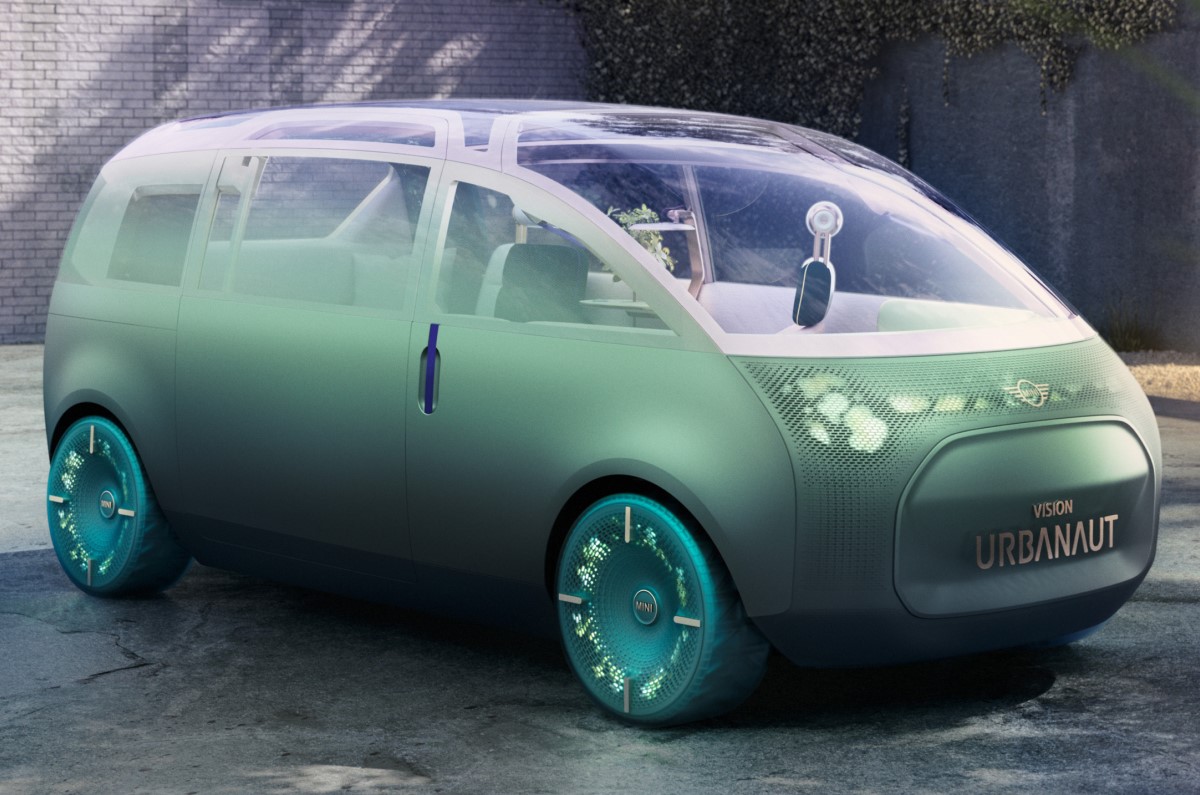
The Mini Vision Urbanaut concept is the most radical addition to its line-up that the British firm has plotted, in the form of a spacious new MPV.
- Conceived as a new interpretation of Mini’s ‘clever use of space’ mantra
- Previews design elements set to feature on next-generation models
- Is being considered as both, a passenger car, and as an urban commercial vehicle
Mini Urbanaut exterior design
The Mini Urbanaut was conceived as a new interpretation of the ‘clever use of space’ mantra, which has been used since the launch of the original Mini in 1959. It forgoes the classic two-box silhouette of all the of brand’s current models for a tall, one-box design with a long wheelbase and short overhangs. The car measures 4,460mm in length, making it 261mm longer than the current Mini Countryman.
The striking design is the result of an in-house project focused on developing solutions for the future of urban mobility in 2030, showcasing new packaging ideas and the latest electric and autonomous technology.
The Urbanaut heralds a new interpretation of the traditional Mini grille, being octagonal rather than hexagonal in shape, while round headlights sit behind a prominent milled-aluminium cover.The concept’s vertical sides have a largely uncluttered look, with smooth surfacing devoid of any major feature lines.
At the rear, the window recalls the shape of the grille, while the wheels are inspired by those of a skateboard, lighting up in one of three Mini mood themes – Chill, Wanderlust or Vibe – when they rotate. The tyres feature a tread pattern resembling the Union Jack.
Mini Urbanaut cabin
The Urbanaut’s cabin is entered through a large single side door that uses a slide-and-swivel mechanism to enable parking in tight spaces. In a design twist that recalls the Isetta bubble car produced by BMW between 1955 and 1962, the large windscreen is designed to open when the Urbanaut is stationary.
The tall glasshouse and glazed roof aim to flood the interior with natural light. Its lounge-like ambience is made possible by a steering wheel that was conceived to stow away when not in use and front seats that swivel around to face the rear. The rear seats fold away to form a sofa and a large digital panel is integrated into the interior trim and roof.
While this concept interior is intended to preview how future urban vehicles can be used as a ‘mobile living space’, Mini has already built interior packaging models of the Urbanaut that feature a more conventional layout, with seats that fold flat to provide a bed.
Mini Urbanaut production
While the Mini Urbanaut so far exists only in digital renderings, company bosses are seriously considering a production version of the model, though not until at least 2027. Mini boss Bernd Körber also said the Urbanaut previews design features that will be seen on the brand’s next generation of models, beginning with the three-door hatchback due in 2023.
A production version of the Urbanaut is being considered as both, a 5-seat passenger car, and as a commercial version for urban deliveries. That would give Mini’s parent firm, BMW, a competitor to the popular small vans sold by rivals Mercedes-Benz and internationally, Volkswagen.
Current Mini line-up
Mini also is currently working on its next-generation hatchback, which will be closely followed by a new Countryman and a smaller SUV.
Every Mini from now on will be offered with an electrified powertrain. The firm is considering potential electric models to expand its line-up in the future, which could include the Urbanaut. The spacious MPV is also seen as a potentially important factor in raising Mini sales in China.
Mini’s design blueprint
Notably, Oliver Heilmer, Mini’s head of design, said the Urbanaut would influence future models: “You will find some citations of design items and language, especially in the interior, that will be translated into series [production] cars in the next model generation.”
The adoption of an MPV bodystyle was made possible by a decision to base the Urbanaut on a new, skateboard-like electric vehicle platform, because this affords greater proportional freedom than the BMW-developed-and-engineered FAAR structure used by Mini today.
“In 1959, the first Mini ushered in a revolution in vehicle construction with its transversely mounted engine,” said Heilmer. “With the Mini Vision Urbanaut, we have been able to rethink and increase the usable surface area inside the car even further in relation to its footprint.”
While BMW hasn’t named the platform that the concept is based on, the production version could use the EV architecture being developed by Spotlight Automotive, a joint venture between BMW and China’s Great Wall Motors.
That platform is set to underpin the new Mini crossover announced late last month and will be produced in China by Spotlight Automotive. The same operation is also planned to produce the next-generation Mini Electric hatchback.
Although bold, the Urbanaut isn’t the first MPV designed by Mini. Under the stewardship of Rover, the brand created the Spiritual Too, which was shown as a concept in 1997.
Mini in India
Mini’s current line-up in India includes the Mini 3-Door, Mini 5-Door, Mini Convertible, Mini Clubman, and the Mini Countryman.
Also see:
Mini Convertible Sidewalk Edition launched at Rs 44.90 lakh
Mini Clubman Indian Summer Red Edition launched at Rs 44.90 lakh
All-electric Mini Cooper in the pipeline for India
from Autocar India - News https://ift.tt/3lY57Qc

0 comments:
Post a Comment